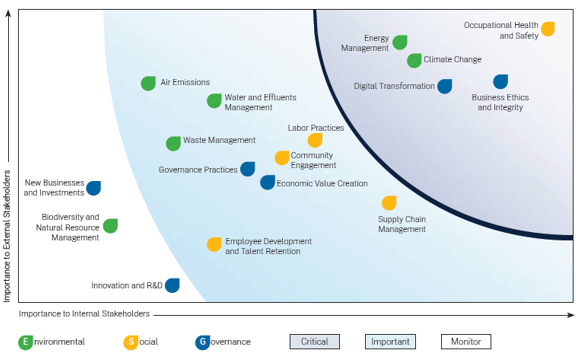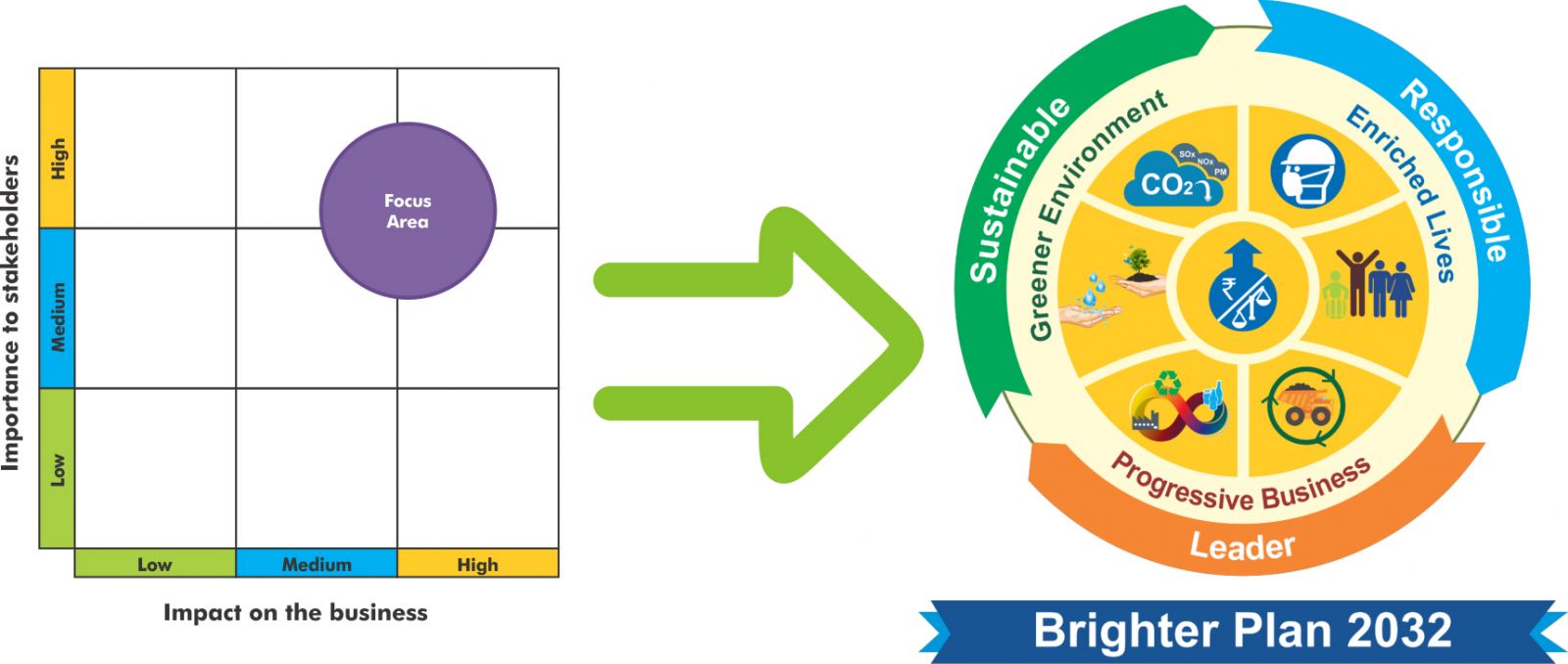NTPC Materiality Assessment
As the leading power company in India, NTPC, along with its valuable stakeholders, provides reliable power while fostering social, economic, and environmental progress in the country. NTPC and its stakeholders have a mutually beneficial relationship, and it can have a significant impact on society, the environment, and the way we conduct business.
Materiality assessment is key to identifying, refining, and assessing potential environmental, social and governance issues that could have a significant impact on a business and its stakeholders. This is an integral aspect of our integrated reporting process and it enables us to short-list and prioritises relevant ESG topics basis its relative importance to our business and stakeholders.
The NTPC Materiality Survey is a key step to gathering stakeholder feedback and it helps us redefine our company’s priorities based on our stakeholder expectations. We conduct the materiality survey periodically (once every 3-4 years) owing to sectoral changes, product and service diversification and developments, changes in the business and external environment, business growth and global megatrends.
Our approach to materiality assessment
A structured methodology has been adopted for materiality assessment on engagement with both internal and external stakeholders. NTPC undertook materiality assessment in FY 2021-22 in collaboration with PwC India. We have developed a 5-phase materiality assessment process for NTPC. Each step is defined while taking into consideration of multiple global reporting standards and peers. This comprehensive and strategic materiality assessment framework will enable NTPC to identify, review, and analyze potential Environmental, Social and Governance (ESG) issues that could impact NTPC's operations and stakeholders in its value chain.

Phase I: Identify stakeholders & potential material topics
A long list of material topics was selected based on the requirements of the following aspects.
- Materiality map of NTPC and peers were taken into consideration: The peers selected for this assessment were businesses which have similar business interests and operations and belong to the same industry sector. Comparing various metrics against peers can give valuable insights. This enabled NTPC to identify material aspects which are not included in previous years but are relevant to the industry.
- Disclosures/rating and agency reports and International ESG frameworks: Rather than adopting a one size fits all approach, referring to standards/ESG disclosure frameworks specific to the sector and industry as these standards and frameworks create a common language for companies and stakeholders, with which the economic, environmental, and social impacts of companies can be communicated and understood. Global Reporting Initiative (GRI), MSCI, Sustainalytics, SASB and BRSR are taken into consideration while creating the long list of applicable material topics.
Phase II: Material topic prioritization
This step involves clustering material topics into focus areas and ranking each material topic as high, medium, or low based on priority. Further prioritization, a long list of ESG material topics are categorised into the broad categories of ESG topics.
Broad categories of ESG topics:
- Climate change
- Environmental Performance
- Employee Well-being
- Supply Chain Sustainability
- Governance
- Community Engagement
- Innovation and R&D
- Digitization
- Business growth and profitability
Phase III: Stakeholder engagement & materiality survey
Strategic questionnaires were developed to identify stakeholder interests and expectations. The survey comprised of two sections.
- Materiality Topics: Survey participants were asked to rate the topics based on their relative importance to them.
- General Questions: Survey participants were asked to mention the stakeholder category they belong to, their name and other general information.
Nine stakeholder groups were selected to participate in the survey; that includes internal (employees and senior management) and external stakeholders (regulators, community, media, suppliers).
Phase IV: Materiality survey analysis & review
Survey results are obtained at the end of the engagement exercise. Ratings were obtained on a scale of 5 (Very High, High, Medium, Low and No opinion). These rankings refer to how a stakeholder considers a focus area important for NTPC’s long term business/ sustainability and themselves/their business. These scorings are further used to develop the materiality matrix, The matrix consist of two-axis; Importance to the business and importance to stakeholders. The final materiality matrix will present a holistic picture of the organization’s sustainability approach, its performance and sustainability topics that are strategic to the business.
Phase V: Materiality matrix development & reporting
NTPC materiality Matrix

For description of material issues please click.
Materiality Assessment driving our Sustainable Business Strategy
The material issues falling under the priority zone have been chosen as the focus areas for NTPC’s Sustainability Strategy. All identified and selected focus areas are mapped across three themes namely as Progressive Business for Governance and Business issues, Greener Environment for environmental issues and Enriched Lives for social issues. Although each concerned issue may have overlapping with varying degree across all the 3 themes, this categorisation intends to highlight the maximum impact or influence in a relevant theme.

As a progressive business, NTPC has set short-term (1-3 years) and long-term (10-15 years) goals for identified focus areas as part of its sustainability strategy. The identified focus areas have been united into a Sustainability Plan with clear programmes, targets and key performance indicators (KPIs) for each aspect. This plan also include clear reporting and communications on progress, allowing for a meaningful dialogue with stakeholders and a consistency of focus that makes reporting more robust. Its effective implementation will involve providing guidance to employees following extensive consultation and putting in place systems of governance, external feedback and regular review. Also, this plan is taken up alongside a supportive policy and specific activities spread across different functions and locations.
The Sustainability Plan will lead to identification of measurable benefits - alongside long-term risks and opportunities – will ensure that our strategy is resilient, and creates real value for the company and society.
NTPC’s sustainability plan has been named as “The Brighter Plan 2032” setting short-term goals to 2022 and long-term goals to 2032 in seven focus areas representing the most significant sustainability issues and opportunities being faced by NTPC: Community Development, Water & Biodiversity Conservation, Decarbonisation & Air emissions control, Circular Economy, Health and Safety, Strong Finance & Ethics and Sustainable Supply Chain.

